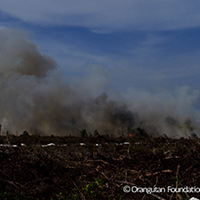A smoky haze blankets the landscape for miles before we reach Rawa Kuno Forest. Off in the distance, great plumes of smoke can be seen emanating from the horizon. At the base of each plume, orange flames reach up and produce the smoke that is being carried off into the sky. Once the sun goes… Continue reading A day of fire-fighting teaches lessons for a lifetime

